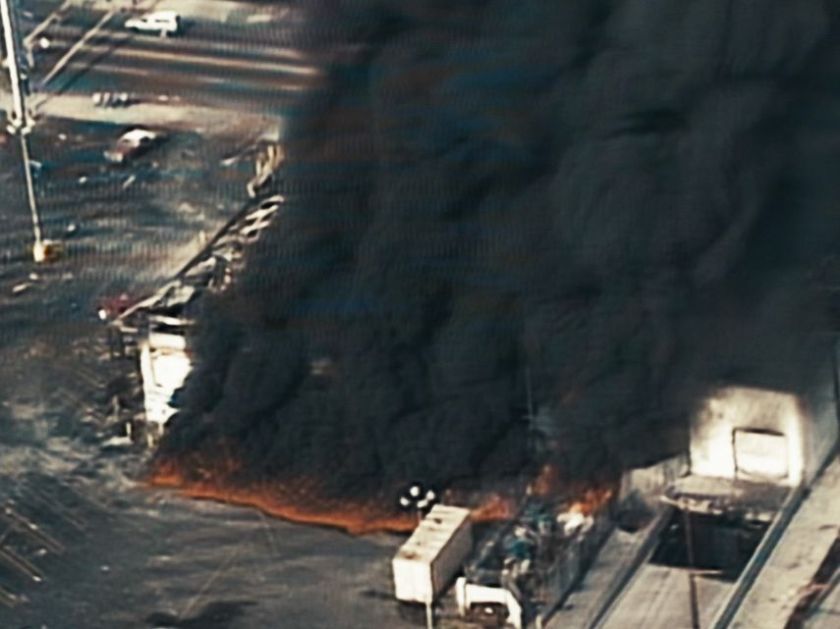LA 92 (2017)

LA 92 is unlike any documentary I’ve ever seen. Few documentaries plunge you into the middle of a rioting city, into the bleeding heart of America itself. Made up entirely of archival footage, including home video, news reports, and behind-the-scenes images, the film tells the story of the violent destruction of much of L.A. following the Rodney King verdict in 1992. The film traces the city’s history of racial discrimination and police brutality that came to a head (once again) with the beating of Rodney King and the exoneration of the police officers by a primarily white jury.
The film begins with footage of the Watts riots in 1965 that followed the brutalizing of two African-American men by police officers. Moving forward to the 1990s, L.A. remained in turmoil, brought to a head when Rodney King was dragged from his car and beaten bloody by several LAPD officers. Not long after King’s beating, a Korean grocery store owner shot and killed fifteen-year-old Latasha Harlins over a carton of orange juice—the shooting, again, caught on the security camera. The owner was eventually convicted but the judge commuted the sentence of sixteen years in prison to community service and a fine. The King verdict, then, is seen in the light of more than thirty years of racial violence in L.A., and the fairly recent spate of violence against African-Americans that the American justice system failed utterly to punish.
The foment of anger and despair is palpable throughout LA 92, and the viewer is forced into close proximity with that anger. It’s impossible to trace the series of events, up close and personal, and fail to understand just what a searing and shocking miscarriage of justice the King verdict was. The energy and the anger is so intense in the lead up to the King verdict that it’s hardly surprising it boiled over into total violence. What is shocking is the degree of violence, and the film draws the viewer directly into the heart of the riots via footage filmed right at the ground level. Protests outside L.A. police departments turn into riots; marches meant to be peaceful boil over into burning and looting, as the city’s incredible fury finally erupts.
LA 92’s greatest strength is that it does not purport to be a political work—it simply shows what happened, and why. It’s a difficult film to watch as it shows, with an unflinching gaze, an American city transforming into a war zone, people bloodied, beaten, cars burned, buildings gutted, and citizens clashing with each other, while police and National Guard troops stand by and do nothing. The lack of concerted police response to the riots exposes a police department and a city government apparently unaware of the degree of anger surrounding the King verdict, and unable or unwilling to do their jobs and protect and serve the people of Los Angeles. There are images here that will be seared in the viewer’s memory: of a woman watching her shop burn, screaming at the unfairness of it; of a man dragged from a truck and beaten almost to death; of Korean shopkeepers arming themselves with automatic weapons to patrol in front of their shops like soldiers; of young men and women, howling in impotent rage, breaking and burning everything in their path because no one will give them justice; of King himself, nearly in tears, begging for it all to stop.
But LA 92 is far more than a historical document—it’s a warning. The film shows, in stark and certain terms, the consequences of a country refusing to provide its citizens, all of them, with the protection and the justice they deserve as human beings. What happened in L.A. in 1992 is not shocking at all, given the current events surrounding police brutality and violence against African-Americans in Ferguson, Cleveland, Baltimore, New York, and across the country. Nothing that happened in L.A. in 1992 was right—not the verdict, not the riots, not the government response, not the loss of life and of property, not the violence done against a city by its own people. But it is the result of an apparently incurable sickness in this nation, as we continue to refuse justice to people because of the color of their skin, as we continue to treat human beings like animals.
It happened before. It is going to happen again.
LA 92 is currently at the Tribeca Film Festival. It will premiere on National Geographic on April 30.